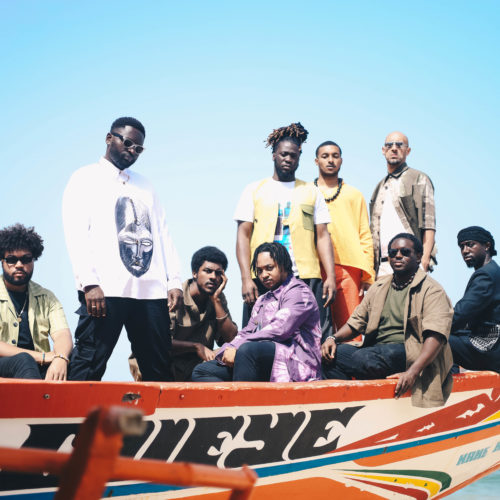
When The Dust Settles
—
Out July 21st
—
New Soil



The Balimaya Project story begins in Harlesden, north west London, when a young Yahael Camara Onono first encountered the Mandé drumming of his West African heritage. Born to a Nigerian mother and a Senegalese father, Camara Onono grew up surrounded by the rhythms of the diaspora, while also absorbing the multi-genre lingua franca of London’s hybrid music scenes.
Mentored by Djembe master Sidiki Dembéle, Camara Onono forged a percussive style grounded in Mandé traditions. He listened to Nahawa Doumbia, Oumou Sangaré, Salif Keita and Ali Farka Touré on the one hand, and Marvin Gaye, Mahalia Jackson, D’Angelo and Vybz Kartel on the other, developing what he calls a “London ear” for the way the city’s jazz, grime and funky house sounds were underpinned by African and Caribbean rhythmic influence. “I’ve always wanted to do something that is an accurate representation of how West African music is perceived in the diaspora, and how it comes into contact with other genres and something that accurately expresses my musical trajectory,” he explains.
Cutting his teeth in Afro-Venezuelan 8-piece Family Atlantica and shape-shifting jazz outfit Maisha, his impulse to articulate how the folkloric traditions of West African culture manifested and connected with his experiences as a young Black man living in London was too strong to ignore. And so, in 2019, Balimaya Project was born.
Given encouragement and a platform by grassroots enterprise Jazz Re:freshed, he assembled a 16-piece band that straddled generations, social circles and backgrounds, but like him were united by their experience of what he calls the “third culture” of second generation migrants. Drawing on the talent and expertise of London-based musicians from Burkina Faso to the Gambia, Balimaya Project sought to engage intentionally with the musical and cultural nuances so often overlooked in the discourse around music from the African continent.
“What I want Balimaya Project to do is to force people to look at this music in its specificity,” he expands. “Not only is this the folklore but this is how it has developed, and how the children of that folklore have taken it and perceive it, because it’s very much contemporary and very much alive.”
In 2021, Balimaya Project released their debut album Wolo So, and they haven’t looked back. Drawing comparisons with Fela Kuti’s Egypt 80 and Sun Ra’s Arkestra for the sheer power and scale of the band, this celebration of collective polyrhythms, blazing frontline horns & virtuosic kora styling was a statement of arrival. A Guardian album of the year and Songlines’ newcomer award followed, propelling the band from relative obscurity to the top of line-ups at festivals around the world, from Supersonic Jazz in Amsterdam to SXSW in Austin, Texas. In early 2023, Camara Onono realised a dream to bring the band back to Senegal to perform.
If Balimaya Project’s debut album emphasised tradition and culture in a collective sense, then their second album When The Dust Settles, released in July 2023, addresses the emotional and the deeply personal too, tapping into the ethos of support and brotherhood baked into the DNA of the project.
“From the first album to this one, one thing that’s really linking us is that concept of family and the bonds are getting stronger every time,” he explains. Translated as the essence of kinship in the Maninka language, Balimaya was always intended to be a safe and supportive space for young Black men to create together.
A maturation in sound and approach, When The Dust Settles brings Camara Onono’s lived experience to the fore, dealing with the death of his older brother, losing a child, becoming a father, migration, survival and the search for truth. “My personal themes are things that I think other people can also relate to. But they’re also part of being a young Black man in a diaspora, which is grief, anger, rage, joy – all the different elements that make up a man and a Black man, which are the same feelings and emotions that everyone else can feel,” he elaborates.
In many ways a continuation of the Mandé jazz and musical interplay of the first record, When The Dust Settles also marks a change of direction for the band. Slimmed to the core thirteen members, Camara Onono encouraged a different approach to recording and writing. Rather than entering the studio with a set of rehearsed ideas, , Camara Onono guiding the process while also leaning on the band members’ specific styles and abilities. A collaborative enterprise to the last, there’s no limit to how far Balimaya Project’s strength of purpose and connection can take them.
This sounds almost like it wasnt arranged and worked out before hand…I still had worked out Ideas and had definitive pieces and arrangements
Ok will make a change here
Sure – good point. How about we condense this sentence so it reads: “Slimmed to thirteen members, Camara Onono encouraged a different approach to recording and writing, writing and arranging the music while also leaning on the band members’ specific styles and abilities in the process.”
Hopefully that resolves yahaels point.
Regarding “13”, chatting about this with Fred just now, BP is an evolving large ensemble, for example there will be 25 members at the upcoming Barbican show. I like the numbers to show the scale, perhaps just adding “core thirteen” or something similar or maybe less even less definitive
Yep makes sense. Have added in